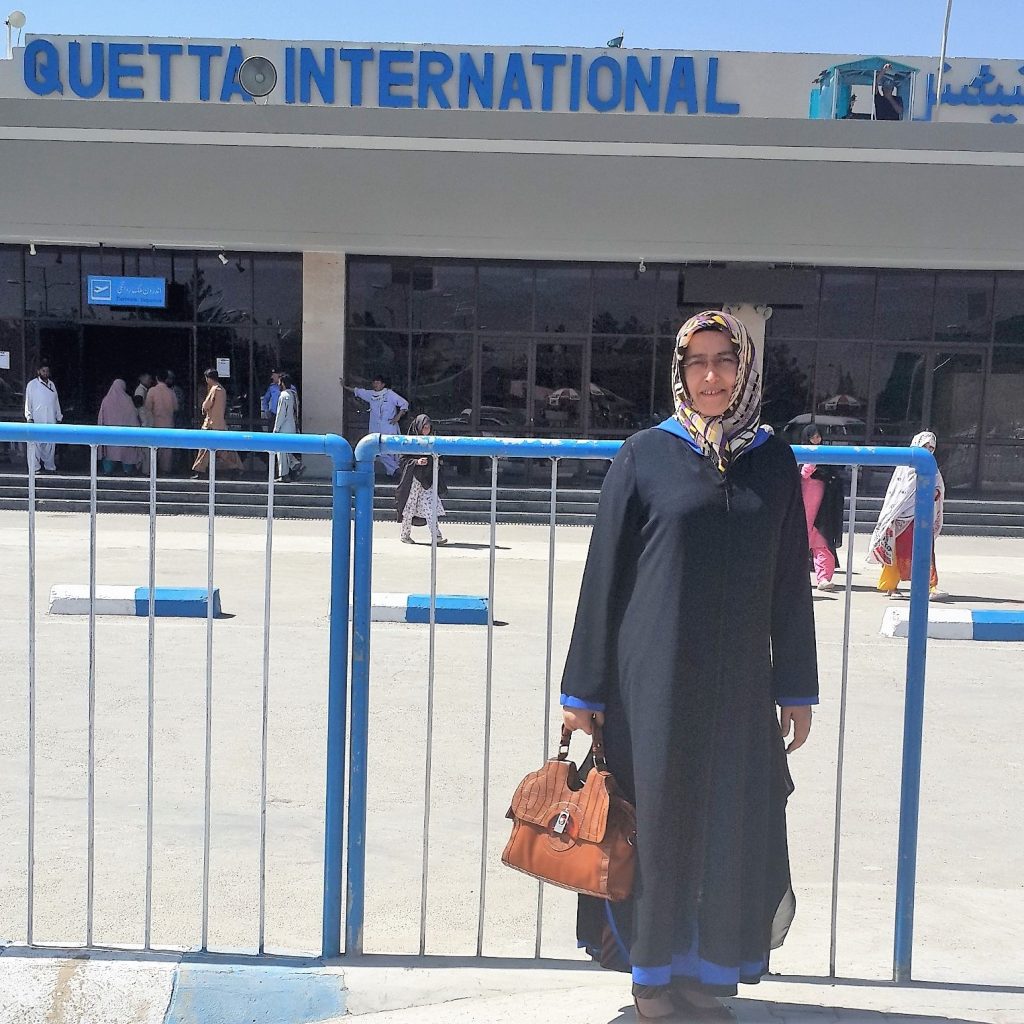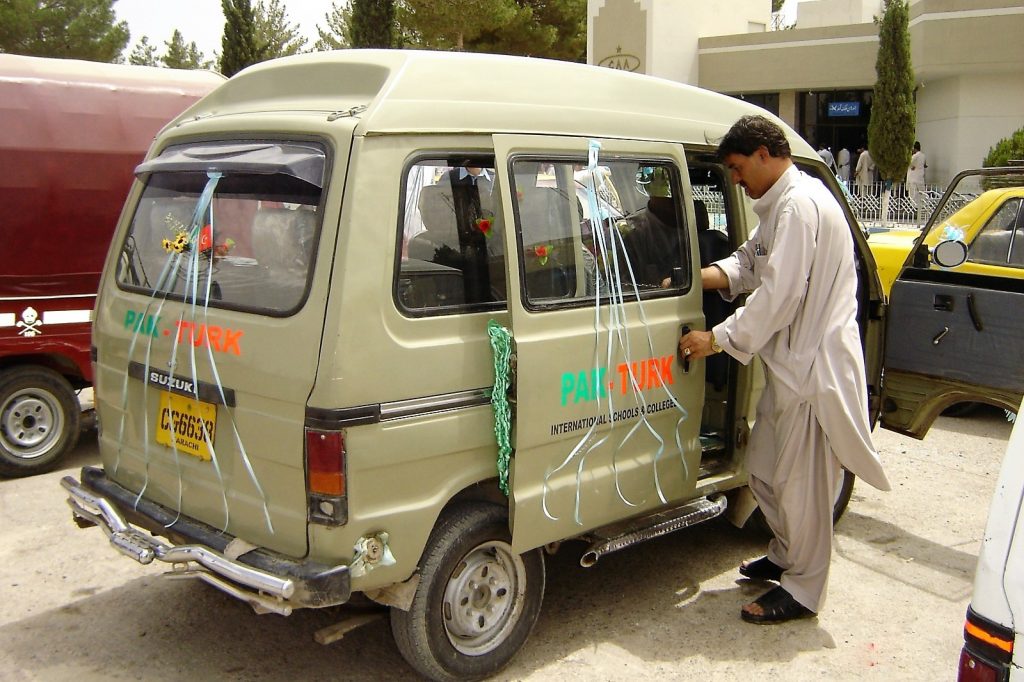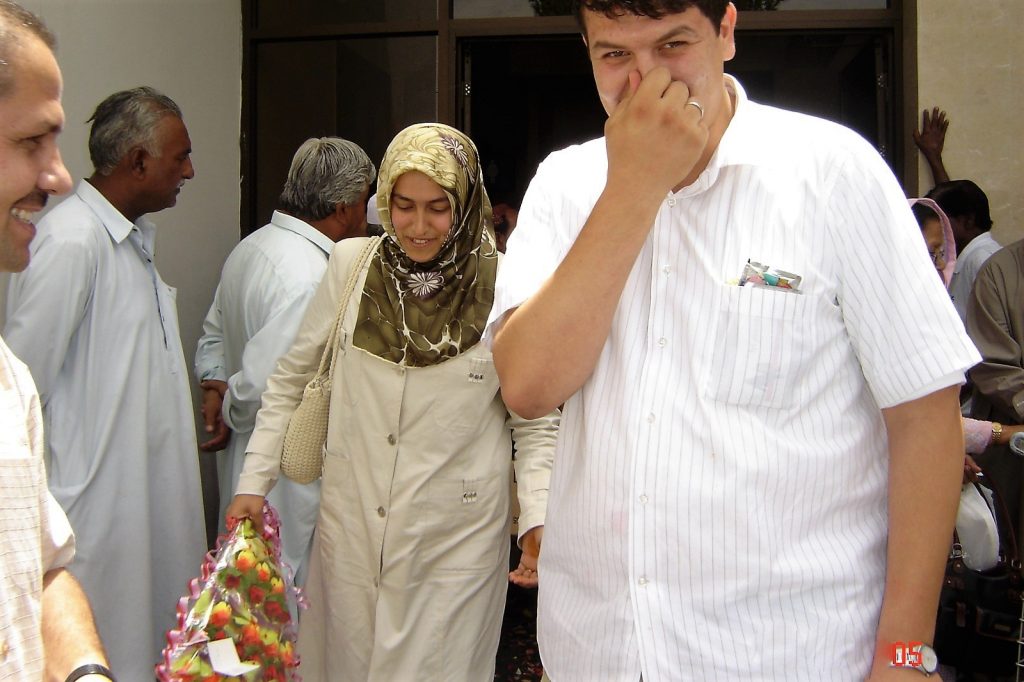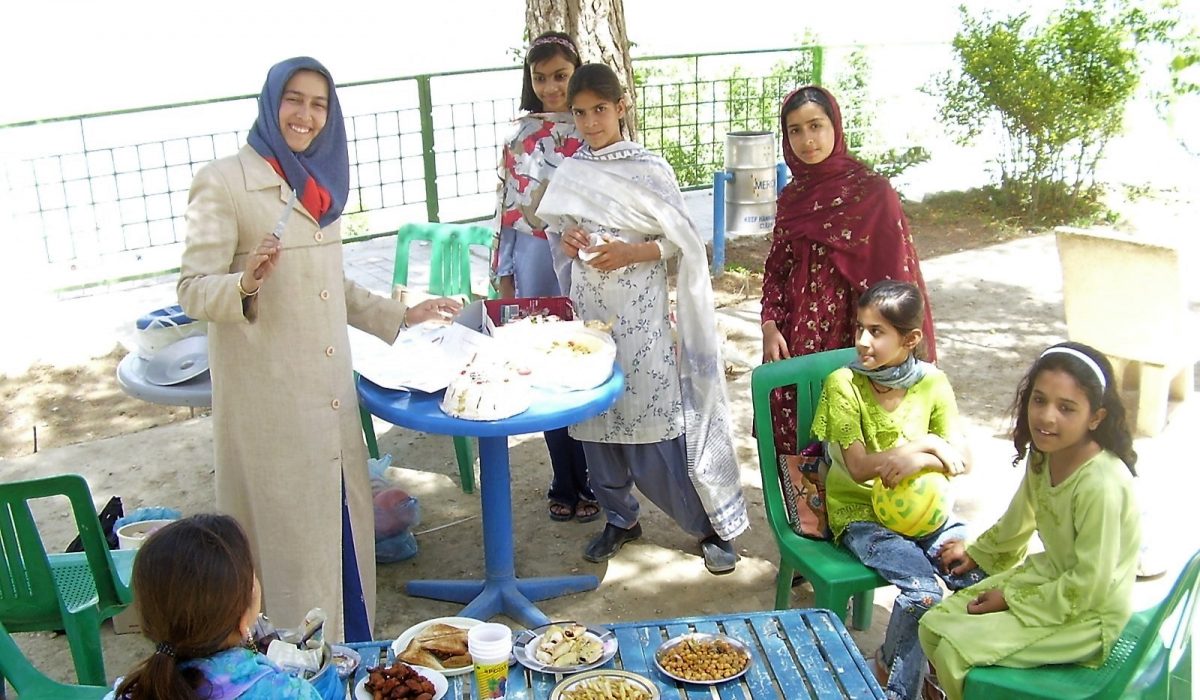Teacher Zübeyde who was given a welcome of roses in Quetta (1): I cannot forget the innocence in my students’ eyes

‘Disaster of the Century’ and Iqbalia Town (Documentary)
April 21, 2021
Times when we were caught in the middle of social events!
April 22, 2021Zübeyde Koçyiğit, who taught Islamiat at PakTurk Schools, had the Pakistan episode in her life started before she even got there. That was because, when she did not even think about going to Pakistan, the wardens at the Masjid an-Nabawi would guide her by saying, ‘Welcome, Pakistani sister’ during her Umrah visit in Madinah. It turned out that analogy, which she had experienced many times, pointed to the path of destiny paved for Zübeyde, who had just graduated from the university.
In the first part of our interview with Ms. Zübeyde, who narrated her memories in Pakistan where she lived for 12 ½ years, you would read how she was surprised when she was greeted with roses in Quetta and the services she performed amidst resonant explosions. Despite the complications, hardships, illnesses and the pang of forced separation, there are many things in Pakistan that Teacher Zübeyde still cannot forget… the most significant of which is the innocence in the eyes of her students…
-May you briefly describe your life before Pakistan?
I grew up in Bursa. My father is a teacher. We are five sisters. We’ve all been teachers. I studied at Gazi University Çorum Faculty of Theology. I graduated from there in 2004. We met my husband in the same year. He was teaching in Pakistan. We got married a year later and I migrated to Pakistan.
-Why Pakistan? How did you decide?
While I was still a student, my friends always defined me as ‘the one who wants to go abroad’. I was fortunate to have the opportunity to go for the Umrah in 2004. While entering the Masjid an-Nabawi, the women wardens there would always guide me by saying, “Welcome, Pakistani sister!” I frequently donned a shawl over my headscarf. Maybe that was why or maybe they were mistaking my complexion with that of Pakistanis, I had no idea. I would always reply them, “I am not Pakistani, I am Turkish”. One evening I entered the Masjid an-Nabawi. A lecture was in progress and I was a little late. I was looking for my own group. A woman warden approached; she took me and placed me in the group of Pakistanis once again.
During the Umrah, I had prayed to Allah to bestow me with the opportunity to go a place where I would be able to serve better. Almost a month after my return, I met my future husband. What a synchronicity it was: he was teaching in Pakistan. After our engagement, my husband wished we should get married without much delay and travel to Pakistan together. However, I wished to stay in the city where I had studied and supervise my students for another year. My husband came to Turkey on summer vacation the following year. We got married on July 21, 2005. In those days, we experienced yet another beautiful synchronicity. A group of 35 Pakistani parents who had come to visit Turkey with a friend of mine also came to our wedding in Bursa. They had brought gifts. I was very surprised and delighted as well. We set out for Pakistan nine days after our wedding.
WHEN WE ARRIVED IN QUETTA, IT WAS RAINING ROSES!
What did you know about Pakistan before you went there? Did you do any research?
I had some friends who knew some teachers working in Pakistan. My friends narrated to me some of things they had heard from those teachers, but I did not heed much. Allah instilled in me the peace of reassurance and a spirit of tranquillity. I did not seek much, and I did not search the country on the Internet. Generally, it is not the facts, but the most beautiful tourist attractions of a country are showcased in searches. We landed in Karachi on August 1, 2005. A family greeted us and took us to their home.

-What were your first impressions?
First of all, it was very hot. I first thought that welcoming jet of warm air I felt the time I was getting off the plane was “the heat generated by the engines of the airliner”. However, when I walked away from the terminal and entered the city, I was faced with the reality. A very warm country it was and humidity increased the felt temperature even more.
-In which city did you first live?
My husband was an English teacher in Quetta, the capital of the Balochistan province, but he also had public relations and other responsibilities. Quetta is a partially barren city near Pakistan’s border with Afghanistan. After staying in Karachi for a day, we took a flight to Quetta. Friends still recall the shriek I let out the first time I saw the city from the window of the descending plane. Looking down, I had seen a dusty city and mud-brick houses. No doubt, I felt a bit of resentment at that moment.
There are Suzuki minivans known as ‘Bolan’ in Pakistan. One of those minivans arrived to receive us. It was festooned in our honour. We loaded our luggage in the trolley and came out of the terminal building. I saw armed personnel everywhere and I felt much apprehensive. The time we came out of the terminal building, I suddenly sensed a sharp fragrance of roses. I was surprised. Later, a shower of rose petals started. It appeared that our friends showered us with rose petals. I later learnt that was a tradition in Pakistan. Those who arrived in Pakistan for the first time in their lives and those who returned from a long journey or from the Hajj or the Umrah would be welcomed that way. Pakistan’s roses are renowned for their fragrance. Since we always remembered Rasulullah (sallAllahu alayhi wa sallam) whenever we smelled fragrant roses, I remembered him the time I smelled the rosy fragrance the very first time there. Later, I realized the fact, of course. The fragrance wafted from the real roses.
DURING THEIR FIRST-EVER MIGRATION, EVERYONE’S PUT TO TEST WITH A DIFFERENT ORDEAL
Our colleagues from the school welcomed us. We were hosted by sister Ayşe Bayazit at their home. It was very hot and I could not help hearing the buzz of the ceiling fan at high speed. Having an air-conditioner was a luxury for us in those days. My husband had rented a house, but it was still under renovation. We visited the house and saw that the workers had been installing the kitchen cabinets. As for me, a lot had to be done for the house to consider it as ready. It was in my opinion of course. I later learnt that the floors were meant to remain as untiled concrete… Before shifting to our house, I fell ill.

-What kind of illness? How was your treatment process?
Actually, I started feeling chills and shivers while I was on the plane. That feeling passed when we landed in Karachi, and I did not care much then. When I was struck by the same upsetting condition in Quetta, we went to the hospital. The medics conducted an extensive check-up. It turned out that my appendix was about to burst. I underwent surgery three days later. That was a setup which I thought was not thoroughly hygienic. After staying at that hospital for a few more days, I was discharged; however, unfortunately, I had contracted an infection. That was why, my treatment lasted for months. I believe everyone is definitely put to a test through an ordeal cut to their size when they migrate for the first time. That is the test of migration. My test was that illness.
-What kind of life did you have in Quetta? What did you do?
We stayed there for ten months. After the completion of my treatment, I started to teach Qur’an lessons in the PakTurk School there. I did not know Urdu yet. I learnt it later. I had a little conversational English. Usually, there is not much need for English in Qur’an lessons. I was telling short stories to the children during the breaks. Second graders were my first students. The children were very active. I never forget that student named Mustafa. He was constantly misbehaving. One day, I gently squeezed his nose. It turned out that the boy had a problem with his nose and it started bleeding. I did not know how to react. I took him to the washroom and washed his hand and face. When the bleeding stopped, I took him to the canteen. I told him that I had not intended to hurt him and that I had done so in a loving manner. I bought things for both him and the other students in the class. When he returned to the classroom, Mustafa continued to misbehave as if nothing had happened. The next day I saw Mustafa had stuffed napkins in his nose and he was moving around saying, “My nose! My nose!” After he caught my attention, he asked, “Are we going to the canteen?” Of course, I knew what he meant.
WHEN THE BOMB EXPLODED, I THOUGHT MY LIFE WAS OVER
I cannot forget the innocence in the eyes of the children there. There is a distinct innocence in those people’s eyes. They always have an expressive peculiarity. That is not an issue of wealth or poverty. You feel it. I have been in different countries. The disposition there was different.
Quetta was like a zone of deprivation. There was sparse greenery. There was no outdoor place where you would go out and have tea. There was a place with the sign, “Ladies Park” with a couple of trees in it, and we used to go there for picnics. During those days, bombs would go off in the city probably once a month. There were also sectarian conflicts among the Shia and Sunni groups. The bomb explosions were something that had become commonplace and in time we started feeling much less surprised.
I and a friend had started attending to a newly-opened language school for improving our English. The language school managed to continue for about two weeks before it was shuttered for good. It was located in a neighbourhood densely populated with Shia citizens. A bomb went off there and we all felt that unspeakable fear and horror. I and my friend were in a Bolan minivan and we were trying to get back home. We were suddenly caught in the crowd coming from the opposite direction. There were also gunmen. I will never forget that moment. I thought my life was over right there and then. During those days, I was also experiencing my first pregnancy. In the evening of that day, I miscarried my two-month-old baby.

Those who visited Pakistan from Turkey or other countries would be generally taken to larger cities; not many of them would visit Quetta. If those who occasionally patted on our backs and asked us even when we were in other cities of Pakistan, “How on earth do you manage to live here?” visited Quetta or Khairpur Mirs, I wonder what would remain in their minds their way back home. Yet, I still had my best times and my first thrill as a teacher there.
I MISSED A LOT FOR HAVING NOT EATEN BIRYANI EARLIER
-How was your relationship with the parents of your students?
We met the parents once a week in groups. Some of them had also come to my wedding. We would set exquisite tables for them and try to communicate with them to the best of our language skills. We had limited means but we did our best and tried to serve the particular flavours of the Turkish cuisine to them. The parents would also invite us to their homes. Catering to guests is a central tradition in Pakistan. They serve you all what they have in their houses. For example, if we cook meat, we do not cook fish for our guests. However, the Pakistani hosts place meat, fish, chicken and all what they have on the table. You certainly do not know from where to start eating.
-What did they think about Turkish food?
They generally liked it, but they were distant to eggplant and stuffed vine leaves, which we cherish a lot. They considered eggplant the food for the poor. One day, I and my friends had stuffed vine leaves and got tired during the process. As for us, that was a highly precious treat for the guests. The visiting ladies asked us, “What is this?” We explained to them by telling how each vine leaf was stuffed with rice and other fillings. Having listened to us, our guests opened the vine leaves one by one, set them aside and just ate the rice inside. How hard we had toiled while wrapping each one of them to shape!
Biryani is one of the most renowned dishes in Pakistan. It looks like rice with meat but is seasoned with bay leaves, turmeric, and other special spices of the land to the extent of turning its colour to yellow. When I first saw biryani, the aroma felt heavy for me, and I could not taste it at all. During my stay in Pakistan, I refrained from eating biryani. Friends simply could not believe how I declined eating it. Whenever I was invited to a dinner party, I used to pack my own meal from home because I knew everyone there would eat biryani. “You’re missing the opportunity of a lifetime!” my friends would say to tease me.
In Canada, where we live now, we met a Pakistani family and they invited us to dinner. Of course, they had cooked biryani. During that dinner, I tasted biryani and liked it a lot. Now I eat it wherever I find it. I realized I had missed sampling many things. My yearning for Pakistan urges me eat biryani.
To be continued…





No Comment.